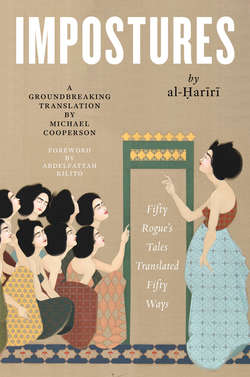Читать книгу Impostures - al-Ḥarīrī - Страница 5
На сайте Литреса книга снята с продажи.
Acknowledgements
ОглавлениеI am indebted to the Library of Arabic Literature for giving me a chance to play with the impossible. The members of the Executive Board—Philip Kennedy, James Montgomery, and Shawkat M. Toorawa, along with editorial director Chip Rossetti—amiably insisted that this translation meet the high standard they have established for the series. All devoted countless hours to ensuring that it did. My project editor, Devin J. Stewart, kept me honest and made the Notes a good deal more informative. Volume editor Richard Sieburth offered bracing responses to every one of my drafts, along with multilingual riffs on themes I had glimpsed only dimly in the Arabic. The members of the Editorial Board, particularly Joseph Lowry and Maurice Pomerantz, were generous throughout. Besides carefully reviewing the Arabic text, Matthew Keegan shared his digital copies of the earliest manuscripts as well as his ongoing scholarly work on al-Ḥarīrī. Rory MacDonald assisted me in editing several of the Arabic Impostures. Abdelfattah Kilito was kind enough to write the Foreword, beautifully translated by Shawkat M. Toorawa. Copyeditor Keith Miller, proofreader Wiam El-Tamami, cartographer Martin Grosch, digital production manager Stuart Brown, and assistant editor Lucie Taylor all did meticulous work on the text and the volume.
Of the many friends whose kindness I fear I have abused, I am most grateful to Phillip Mitsis and Jeannie Miller, who commented incisively on early drafts. Several of the Impostures were translated with the help of those better acquainted than I with the variety of English I was trying to use. These include Jeremy Fernando and Philip Jeyaretnam (Singlish, Imposture 3), James Montgomery (Scots English, 14), Shawkat M. Toorawa (Indian English, 15), and Tony C. Brown (Kiwi, 28). Leyla Rouhi corrected the Spanish part of my Spanglish (16). Nandi Sims advised me on African-American Language (21) and US college slang (37). Phillip Mitsis, Peter Goodrich, and Joseph Lowry helped compose the puns in Imposture 32. Mel Tom corrected the current London slang (23). Slavomír Čéplö put the Arabic and Persian names in Imposture 40 into plausible Irish forms. Stuart Brown corrected the Cockney (44). Richard Ali, who entirely rewrote my Naijá, should be considered a co-author of Imposture 45.
In working with translated Impostures and related works in various languages, I benefited from the kind assistance of many friends and colleagues, including Ailin Qian and Shiyi Zhou (Chinese); Slavomír Čéplö, Yasser Djazaerly, Julia Hauser, and M. Rahim Shayegan (German); Alexandre Roberts and Phillip Mitsis (Greek); Catherine Bonesho, Abraham Greenstein, Lev Hakkak, and Yona Sabar (Hebrew); Jan Loop and Phillip Mitsis (Latin); Domenico Ingenito, Latifeh Hagigi, Ahmad Karimi-Hakkak, and M. Rahim Shayegan (Persian); and Pavel Angelos, Hristina Chobanova-Angelova, Kirill Dmitriev, and Masha Kirasirova (Russian).
Much of the translation was drafted during a LAL fellowship at the New York University campus in Abu Dhabi, where Alexandra Sandu and Amani Alzoubi made me feel welcome. I thank Mahmoud Abdalla, Kirill Dmitriev, Ranya Abdel Rahman, Hossam Barakat, Claire Gallien, Parween Habib, Trevor Kann, Alexander Key, Maru Pabón, Flora Rees, Alexandre Roberts, Sarah R. bin Tyeer, Paul Walker, David Wilmsen, and Luke Yarbrough for inviting me to read or discuss work in progress. I gratefully acknowledge the Forum for Arab and International Relations and the Sheikh Hamad bin Khalifa Award for Translation and International Understanding for their magnanimous support of translators and translation.
Among the many others who shared their expertise, spoke a kind word when it was needed, or inspired me in ways they have probably forgotten are Ahmed Alwishah, Sean Anthony, Zeina Hashem Beck, Abdessalam Benabdelali, Hinrich Biesterfeldt, Kevin Blankinship, Jess Bravin, Dominic Brookshaw, Julia Bray, Richard Bulliet, Brigitte Caland, Frederic Clark, Peter Cole, Nino Dolidze, Emily Drumsta, Shereen El Ezabi, the late Salwa Eltorai, Albert Gatt, Jessica Goldberg, Matthew Gordon, Beatrice Gründler, May Hawas, the late Wolfhart P. Heinrichs, Lucas Herchenroeder, Walid Hamarneh, Tamer M. Hussein, Dominique Jullien, Daniel L. Keegan, Philip Kennedy, Nancy Khalek, Batool Khattab, Zia Khoshsirat, Pamela Klasova, Yaron Klein, Marcel Kurpershoek, the late Abraham Lavi, Chris Lucas, Saree Makdisi, Annabel Mallia, Denise Marie-Teece, Daniel Medin, Ronald Mendoza-De Jesus, Geoffrey Moseley, Shad Naved, Daniel Newman, Bilal Orfali, Tyler Patterson, Charles Perry, Margret Pfeiffer, Jay Phelan, Julia Phelan, Claudia Rapp, Salam Rassi, Hector Reyes, Dwight F. Reynolds, Kishwar Rizvi, Leyla Rouhi, Everett K. Rowson, Christine van-Ruymbeke, Peter Sagal, David Schaberg, Emily Selove, Stuart Semmel, M. Rahim Shayegan, Rebecca Spang, Anna Ziajka Stanton, Denise Sutherland, Adam Talib, Newell Ann Van Auken, Katrien Vanpee, Chathan Vemuri, David Wilmsen, Liran Yadgar, and Luke Yarbrough. I regret that John P. Flanagan did not live to see this book completed; I hope he would have liked it.
I would not have been able to finish a translation based on pastiche and constrained writing without relying on Project Gutenberg, the all-volunteer project that supplies searchable full-text editions of many works in English. Internet Archive provided complete online editions of many critical Arabic texts, and Abū ʿĀṣim Yaḥyā Fatḥī helpfully posted his readings of all fifty Arabic originals on YouTube.
I am indebted to my wife, Mahsa Maleki, her parents, Armita Farhoomand and Mahmoud Malaki, and my brother- and sister-in-law, Hamidreza Maleki and Shima Torabi, for seeing us through two international relocations and taking care of the children while I worked on this book. I am also grateful to my parents, Georgia and Jay N. Cooperson, who kept their doors open throughout. Much of the reading that went into this translation took place years ago in our book-filled house.
